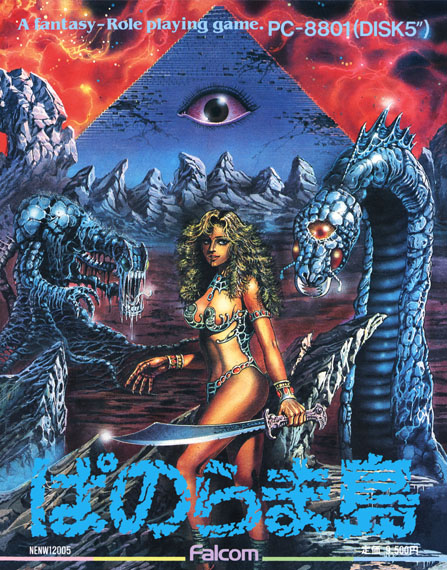
If you thought Dragon Slayer was Falcom's first RPG, you guessed wrong. Well, admittedly it's a bit of a stretch to call Panorama Toh an RPG in the traditional sense, cause there are no stats or level-ups, but Falcom did, so who are we to judge? According to Japanese sites, the game was programmed by Yoshio Kiya, the creator of Dragonslayer and Brandish.
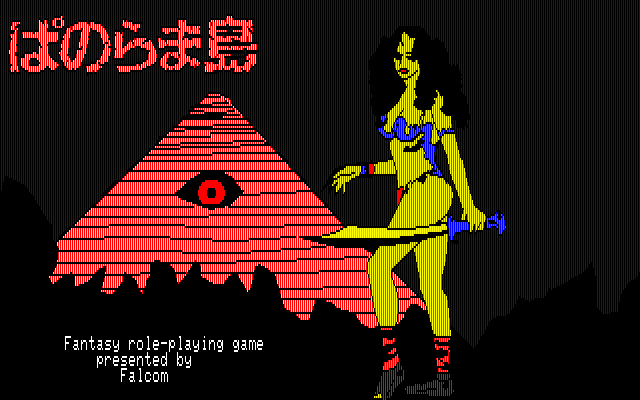
After the title screen, the game opens with a Pac-Man-like scroll, where all the characters, items and locations are introduced. Only here they're much more. You're supposed to press the Help Key on the PC-88 keyboard to start the game, which was mapped to "End" in the Emulator I used.
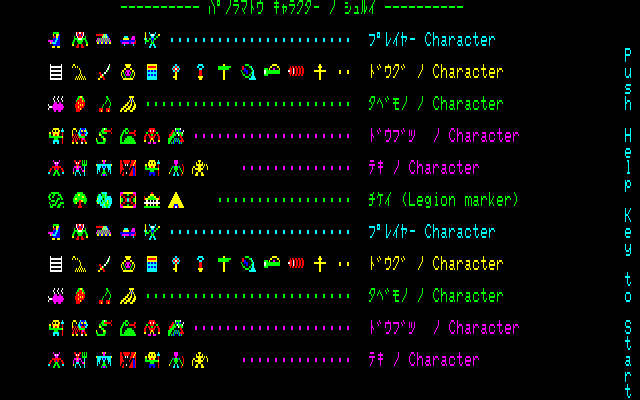
Maybe by virtue of being a Falcom game, there are surprisingly decent scans around for this game, not only of the box cover, but also the map below that came with it, found on this site. Players were probably supposed to mark enemies and traps on it, as their locations are always the same.
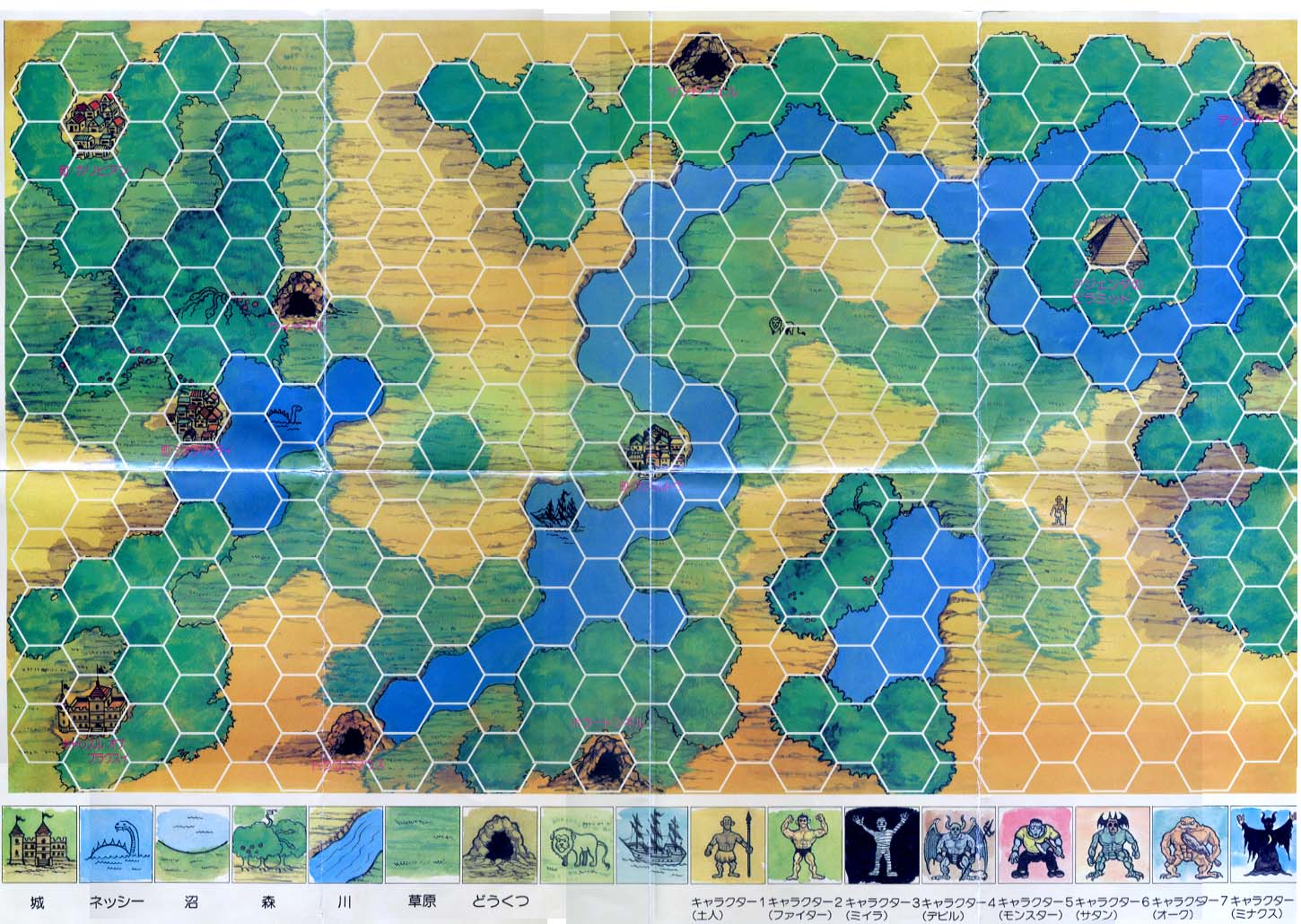
It also shows that the overworld takes place on a hex grid, which isn't immediately apparent when looking at the black background in the game. Therefore, you can only walk left or right in the diagonal directions, which feels a bit weird at first. At the beginning, the game kindly ask you to toggle your Caps Lock, cause coding a routine that deals with lower case characters was apparently just too much to ask for.
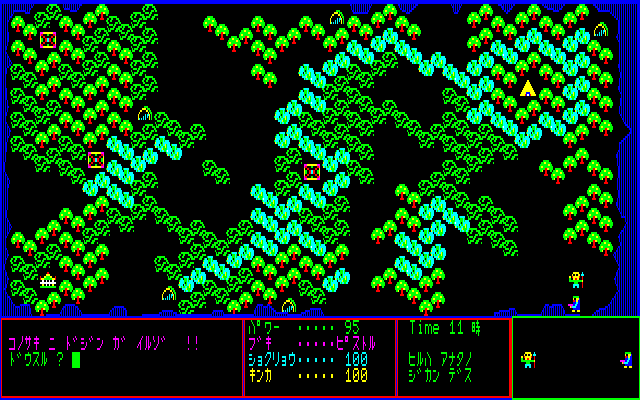
All around the map, you meet these spear-wielding aboriginals. At first I thought they were enemies and pressed (A)ttack, which triggers a little animation at the bottom right and shoot them - that's right, you have a gun at your disposal. It's not easy to tell what kind of setting this is, as it takes place mostly in forest areas where you meet bushmen, snakes or nessie(!), in the dungeons you meet ghosts, demons and other monsters and you can enter a pyramid, but you can also get a tank an power armor.
Turns out the aboriginals are not necessarily hostile, though, and you're not actually supposed to fight them. (T)alking makes them drop a line of exposition or two, like in most Japanese RPGs that followed since. You can also (G)ive them money for items, but you have to guess a number between 1 and 9, and the price of their item is determined randomly, as is the type of item you get afterwards. Whether or not you meet their demands, they always take your money. Sometimes they also just run away with it, no matter how much you gave them. Actually it's never worth buying from them, at least in this version (more on that later).
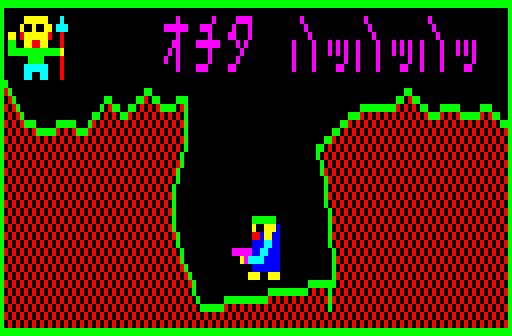
On some fields you end up in a trap like this, whereupon an aboriginal appears and laughs at you. You can try to (J)ump out of it on your own, but every failed attempt (it's random again) costs a not insignificant amount of health. It's usually much less dangerous to (C)all for help, until another aboriginal appears and pulls you up. At some places on the map there are also snakes that bite you. As a result you get paralyzed, and cannot carry on without a medicine. If you don't have any, you can again (C)all an aboriginal for help.
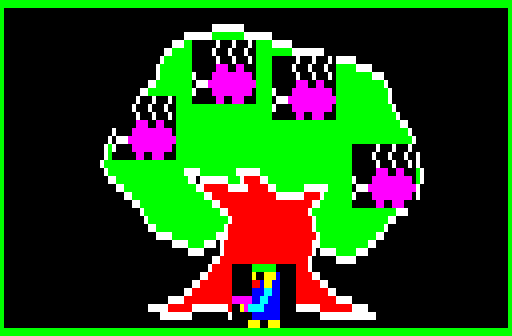
Pretty much any normal action substracts one or two health points as well, but you start the game with 100 rations of (F)ood you can consume at any time to heal yourself. Sometimes you can find a tree with cherries, bananas(!), strawberries(!!) or steaming pork knuckles(!!!), which I suppose refill your rations, but I never got any of them. It seems you need to position yourself with the "4" and "6" keys on the numeral pad, and then (U)se a rope, but I never happend to have one with me when I found a tree.
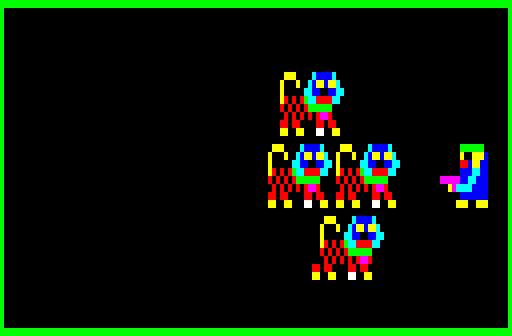
Combat in this game is really weird, as it's more or less real time. Calling it an action RPG would be a bit much, but it is clearly visible that Falcom was getting there eventually. If you meet a lion (or a whole bunch of them, as seen above), it starts to rush at you, and you need to (A)ttack it in time (you might still lose by random determination). If you manage to slaughter a whole pack of lions, you get 30 rations of food. There are also some fights that can be dodged with "8" and "2".
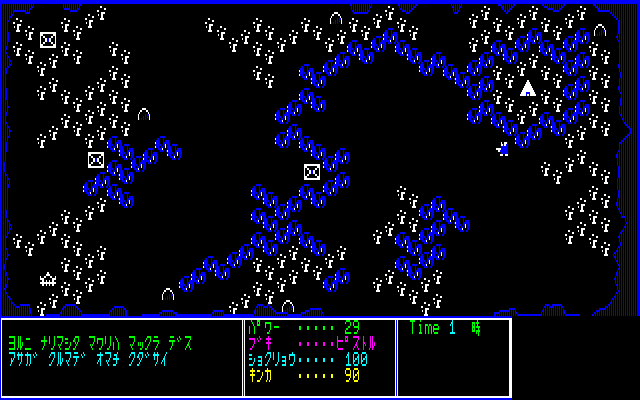
Panorama Toh even has a day-and-night cycle, although at night all you can do is wait for dawn. You cannot move and nothing ever happens at night.
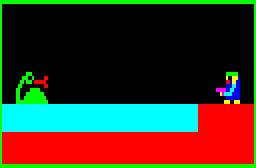
This is Nessie, but you can't actually attack her. The guy just tries to storm at her and then sinks to the ground of the lake.
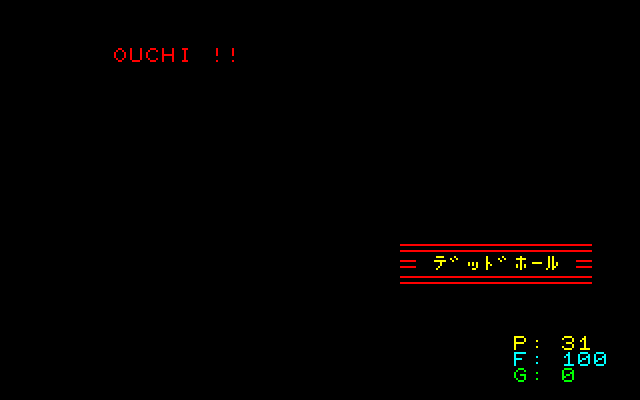
This is one of the caves from the inside. It is pitch dark, and the only means of orientation is the exclamation "Ouchi !!" whenever you hit a wall. Add to that a somewhat unresponsive input and randomly attacking monsters. (A)ttacking them only yields a message that they cannot be hurt without certain artifacts, which of course I don't have, so all I can do is (E)scape. That fortunately always works, but you have to do it quickly, cause the battles here are semi-realtime, too. The monsters are all made of text characters and look kinda cute:
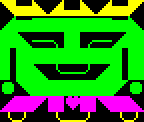
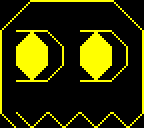
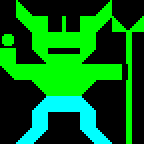
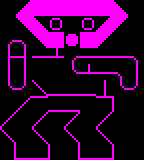
The spelunking didn't go too well, so I guess I should stock up my gear at one of the towns. But they're all at the other side of the river, so I have to find a way across.
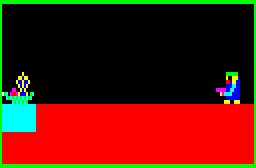
At some points there is actually a ferryman. You can try (A)ttacking him, but it always fails. Trying to (C)all him for help may get his attention - or maybe a bushman runs up to you and stabs you in the face with his spear instead. But even if you manage to employ the boatsman, he doesn't simply drop you off across the river - the one I could convince to take me on his boat for 10 gold pieces just took me down the river for a few fields before leaving me on the same shore I came from. Swimming over is actually more promising: The game makes you keep pressing "4" to the other shore, but you sink down to the ground with random speed, and if you hit the ground before reaching the end, you lose health and have to start again. For some reason this procedure has to be done twice with each crossing, but failing the second one still lets you get across.
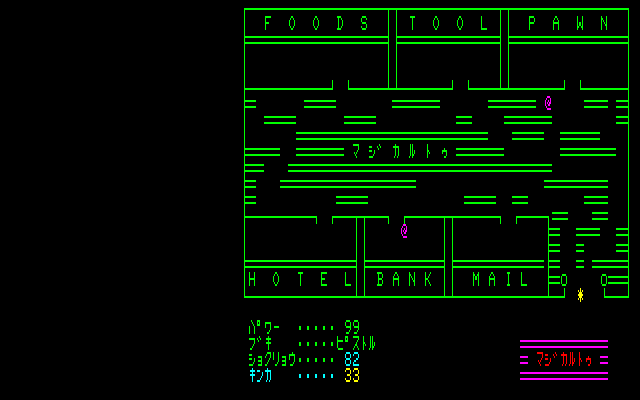
The towns are fun - you are the yellow asteristk, but the purple @-characters are thieves that steal your money. Doesn't matter at all, though, as you'll see shortly
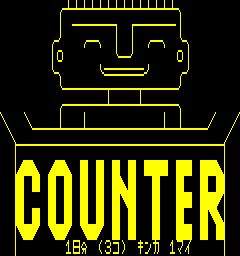
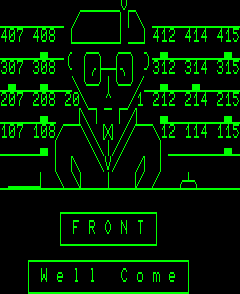
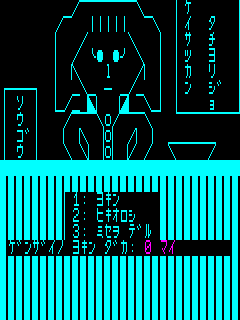
Entering the stores brings up close-up portraits of the shopowners, a feature that carried on to later games like Ys. From left to right: The Foodstuff Store, the Inn and the Bank. The Inn even exists as a 3D space where you can walk up to your room:
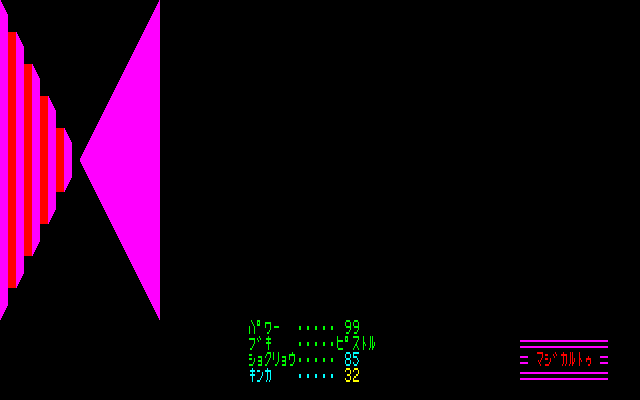
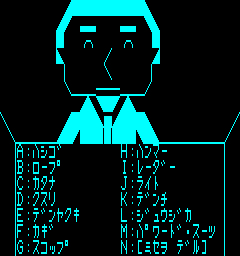
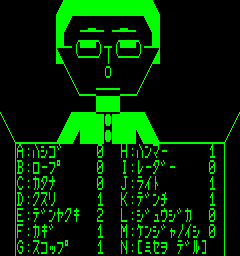
Most important is the tool shop, however, where you can get anything that the aboriginals sell, and then some. The best part of the deal: Almost every item only costs 1 gold coin, and for buying you actually get the money instead of losing it. I have no idea whether this is a bug, or the disk image that's around is hacked. There's also a pawnshop to sell items (above to the right), but given the state the game is in, that is hardly necessary. I bought a flashlight and some batteries, also a radar and a "PWD Suit" (which other than the rest of the items cost 20,000, but once again the shop owner gave me money instead of taking it). The latter is even reflected in the appearance on the overworld (also notice the filled (I)nventory screen to the right):
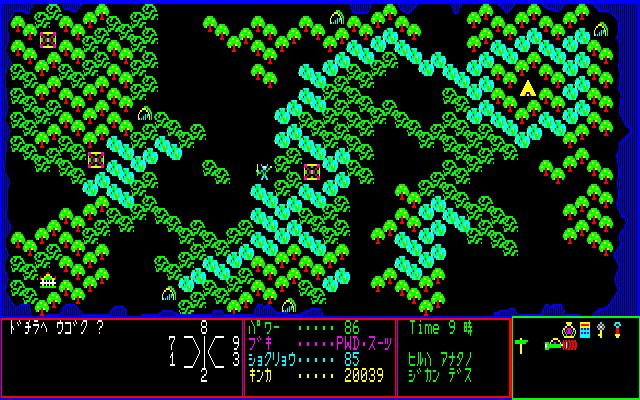
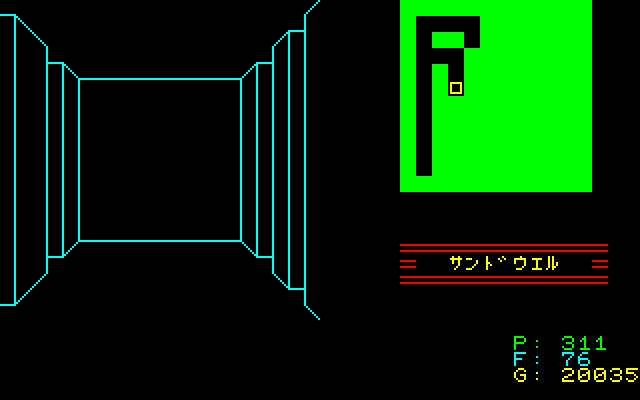
After (U)sing the flashlight, dungeons look like this, in best Wizardry - or rather early Ultima - fashion. Sometimes it's really hard to tell how far away a corridor to the left or right is, resulting in many useless, time-wasting turns. Batteries also die faster than in a Game Gear so I had to get back and stock up more (you can only buy one per menu selection - ugh). Each time a battery runs out, the color of the dungeon walls changes for some reason. Even if the light runs out, though, it isn't too bad with the radar, which draws an automap as you go along. All you have to do is bump into every wall to test the way, while the radar tracks your position. I never found anything of value in the caves, although they do connect one cave entry to another, so I guess that would be an alternative way across the river - after you've been at the city once to get your gear.
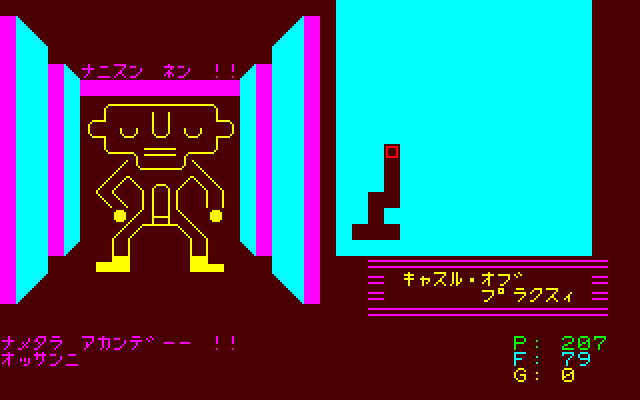
There's also the castle to the southwest, of course. Other than the caves, it is perfectly lit, represented by the solid walls instead of wireframes. It is full of these guys, which I can only interpret as perverts who show off their huge erections. (A)ttacking them makes them go away, but you can also give them all your money if you want. Nothing of this does anything for you. The castle is huge and you get disturbed by them every few steps, so I just gave up on it.
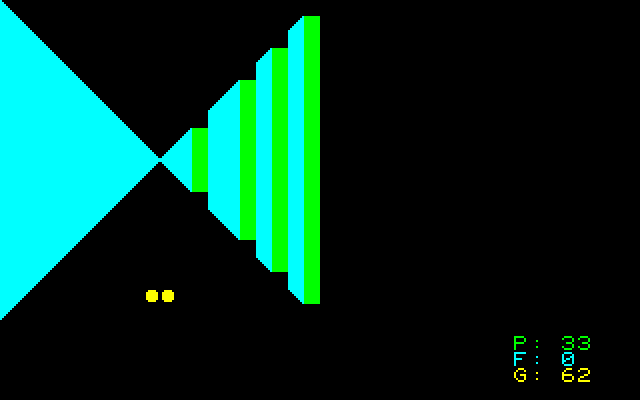
That leaves the pyramid, which houses the only dungeon enemies that can actually be (A)ttacked without magic weapons. There are also two yellow circles lying around everywhere, but I couldn't do anything with them.
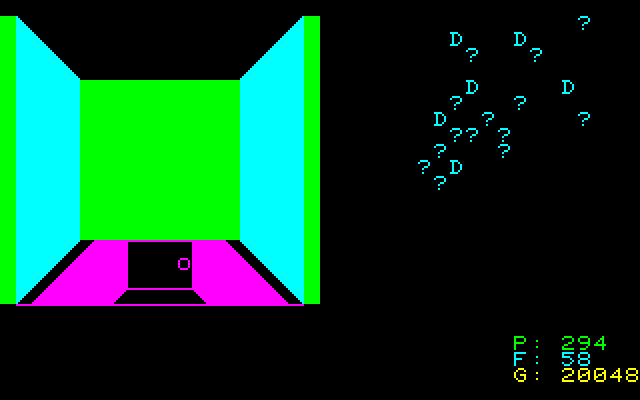
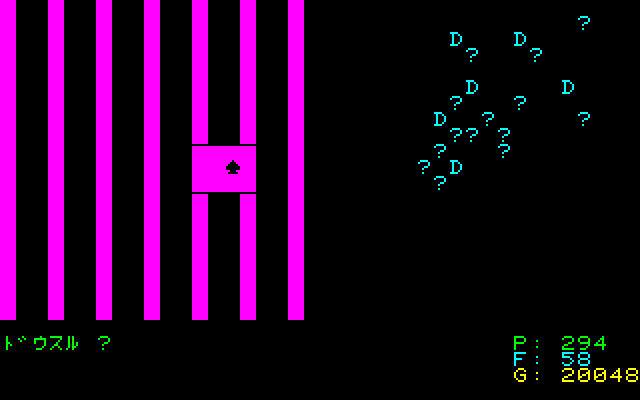
There are several locked doors around the hallways, but (U)sing a key here only gives me the message that it's to be opened and I shall return to the first floor? But I've never been on any other floors other than this? Very strange.
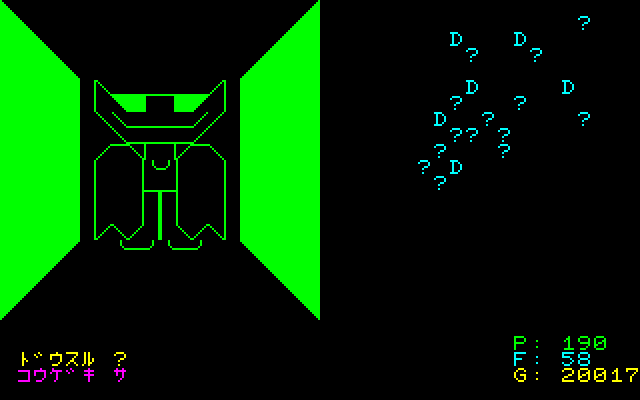
Eventually ASCII Darth Vader here blocks the way, and apparently I need a holy sword to defeat him. But I played Legend of the Holy Sword last week! I give up!

OMG the Illuminati!
ReplyDeleteThese blokes with hard-ons are bugging you because they're restless. The two yellow circles you keep coming across in the pyramid are their testicles, you have to pick them up and bring them back to their original owners.
ReplyDeleteRude theories aside, I love the monsters' design.
This game is kind of the epitome of early Japanese CRPG weirdness, and actually still has a small cult following over there because of it. The strange thing is that Falcom started off as one of the major Apple II game importers (they used to have big price lists in I/O and other computer magazines), so Kiya would definitely have played Ultima, Wizardry, etc. by then and really should have known better. But I guess history proves that he really had his own peculiar ideas about RPG design that ultimately proved quite successful and influential in their own right.
ReplyDeleteThere's really a lot of crazy stuff in this game, including a town with a sauna and "porno shop" that displays an image of a completely nude woman in a spread-eagle pose. All in text characters. The manual is bizarre too, full of rambling quasi-philosophical nonsense. At least the cover art is awesome! Those early Falcom covers are all great. Would have been perfect as album art for those cult fantasy-metal bands of the era that I loved, like Cirith Ungol and Manilla Road.
Anyway, if you're interested in pursuing this game further, there's actually a detailed strategy guide and strange (but funny) article dedicated to this title in Y.Romi's "PC-88 Game No Sekai" CD-Rom. I think it got at least a little bit of coverage back then in Login as well, but I'll have to check.
Great work there. All these games seem really ugly and random. I admire your patience for trying them out.
ReplyDeleteI know that the point of this series is to show JRPGs before DQ, but do you agree that DQ really is the first RPG as we got to know them back in the 90s/early 80s?
By JRPG I mean a distintictive style of RPGs as oppossed to just RPGs being made in Japan(like the ones you show in this series).
JF
Well, I see it more as a gradual process, rather than that one game that changed everything. Dragon Quest did a lot of streamlining due to it being on the Famicom and not on a computer, but it's not fundamentally different from something like Mugen no Shinzou (which will be the covered soon), while Mugen no Shinzou is not fundamentally different from Ultima. In the other direction, the first Final Fantasy is not fundamentally different from the first Dragon Quest, etc.
ReplyDelete